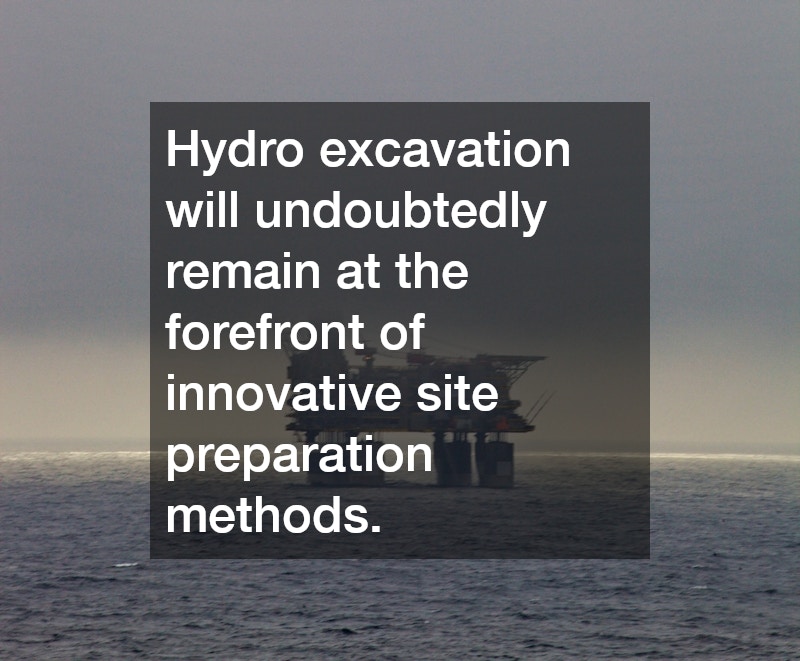In the realm of modern construction and infrastructure development, precision and safety are paramount. As technology advances, traditional digging methods like mechanical excavation are being replaced by more efficient alternatives. One such technique gaining significant traction across Australia is hydro excavation. This non-destructive method utilises high-pressure water and a powerful vacuum system to expose underground utilities and remove soil with minimal disruption.
Below, we explore five key benefits of using hydro excavation for various projects.
Enhanced Safety for Workers & Infrastructure
Safety is a top priority on any worksite, especially when dealing with underground utilities such as gas lines, fibre optic cables or water mains. Traditional mechanical digging methods increase the risk of damaging these essential services, which can lead to serious injuries, costly repairs or extended project delays.
Hydro excavation significantly reduces these risks. The high-pressure water gently breaks up soil, which is then immediately removed by a vacuum, offering unparalleled precision. This method allows crews to locate and expose utility lines without the dangers associated with heavy machinery.
Furthermore, by minimising the use of manual labour and mechanical equipment near sensitive utility areas, the likelihood of workplace injuries drops considerably. This makes hydro excavation an attractive choice for municipalities, utility providers and private contractors who must adhere to strict occupational health and safety standards.
Superior Accuracy & Precision
When it comes to excavation, accuracy is more than a convenience—it is a necessity. Hydro excavation provides a level of precision that traditional methods struggle to achieve. The process allows operators to remove only the soil that is necessary, leaving adjacent areas untouched and preserving the structural integrity of the worksite.
The precision of hydro excavation also contributes to quicker project turnaround times. Since there is less need for backfilling or repair work caused by unintended damage, contractors can stay on schedule and avoid unexpected costs. This makes hydro excavation not only safer but also more efficient in the long run.
Reduced Environmental Impact
Environmental sustainability is an increasingly important consideration in project planning and execution. Traditional excavation methods can result in large-scale ground disruption, soil compaction and damage to nearby vegetation or water systems. These impacts often require additional remediation efforts that can stretch budgets and extend timelines.
Hydro excavation presents a more environmentally friendly option. Its targeted approach means less disturbance to the surrounding landscape, helping to preserve natural habitats and soil structure.
Moreover, the vacuum system collects and contains the displaced soil and water slurry, allowing for proper disposal or reuse. This containment capability reduces the risk of runoff or contamination, aligning with best practices in environmental management. For projects where ecological considerations are paramount, hydro excavation stands out as a responsible and effective solution.
Greater Efficiency & Cost-Effectiveness
While the initial setup for hydro excavation may appear more complex than traditional digging methods, the overall efficiency of the process leads to significant cost savings. The speed and accuracy of hydro excavation reduce the time needed to expose utilities, dig trenches or complete other excavation tasks. This efficiency translates directly into lower labour and equipment costs.
In addition, by reducing the risk of damaging underground assets, hydro excavation helps avoid expensive repair work and liability claims. The precision of the technique also minimises the need for rework or secondary site visits, which can add considerable expense to a project.
For contractors working on tight deadlines or operating within strict budget constraints, the time and cost savings offered by hydro excavation make it a compelling choice. With fewer delays, reduced damage and streamlined processes, project managers can maintain control over timelines and expenditures.
Versatility Across Project Types
One of the most compelling advantages of hydro excavation is its versatility. Whether working on a small residential job or a large-scale industrial site, the method adapts to a wide range of applications. It is ideal for installing signs, poles and footings, as well as for performing maintenance on existing infrastructure without extensive site disturbance.
Hydro excavation is also well-suited for projects conducted in adverse weather conditions or in hard-to-reach locations. Unlike mechanical digging, which may be hindered by frozen ground or tight spaces, hydro excavation equipment can function in various environments with minimal logistical challenges.
This flexibility ensures that contractors can use hydro excavation year-round and across multiple industries, from civil construction to telecommunications and energy. As a result, the method has become an indispensable tool in modern excavation practices across Australia.
Why Hydro Excavation Is the Smart Choice for Modern Projects
The adoption of hydro excavation continues to grow as industry professionals recognise its benefits over conventional digging techniques. By offering enhanced safety, precision, environmental sustainability, cost efficiency and adaptability, this method aligns perfectly with the demands of contemporary projects.
Whether navigating complex urban infrastructure or working in sensitive natural environments, hydro excavation provides a safe and effective solution that meets the needs of today’s contractors and project managers. As construction standards evolve and focus increasingly on sustainability and risk reduction, hydro excavation will undoubtedly remain at the forefront of innovative site preparation methods.
.




